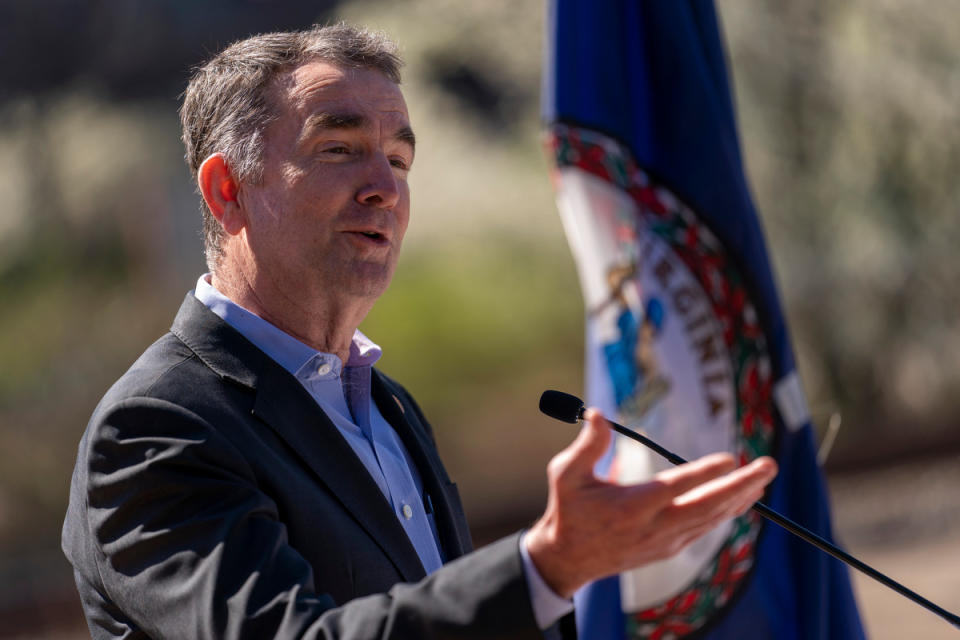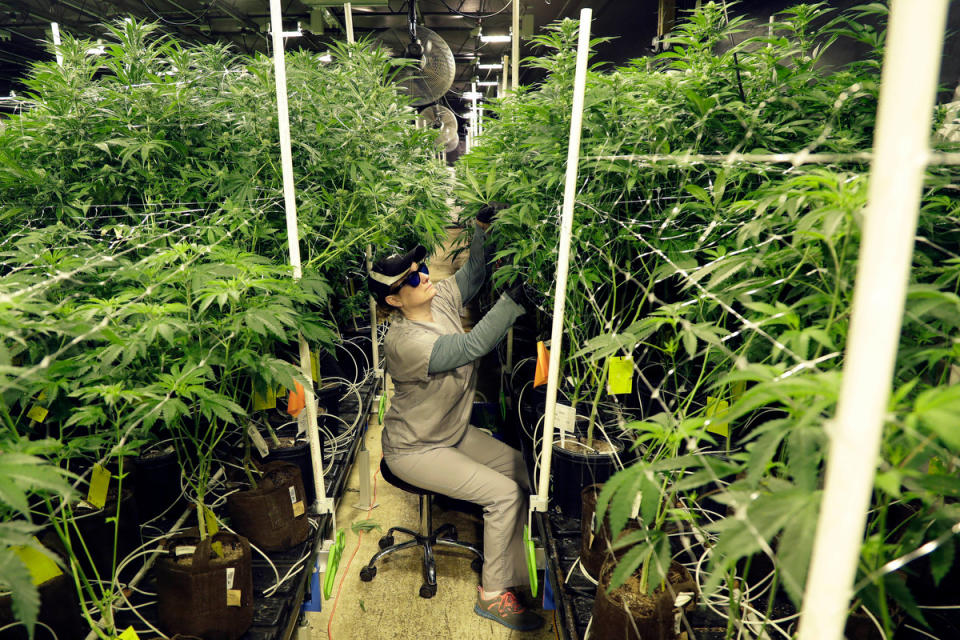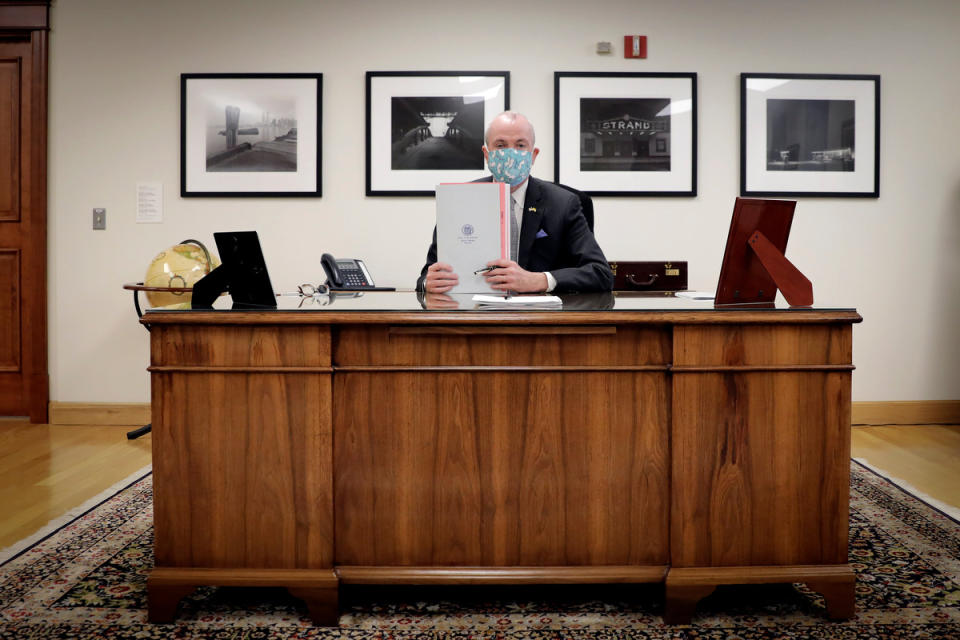Where weed is legal
State legislatures have been slow to catch up to the marijuana legalization trend as, time and again, they let voters decide what to do about decades-old weed laws. That’s changing this year.
Virginia’s Legislature passed a recreational legalization bill in February, becoming the first Southern state to fully embrace weed. Last week, lawmakers in New York and New Mexico legalized weed for adults, after years of failed efforts. New Jersey lawmakers also passed legislation implementing a voter-approved legalization amendment. And more conservative states like Kansas and Alabama are moving medical marijuana legalization bills forward.
More than 40 percent of Americans now live in states — 18 in total — that have embraced full legalization. Roughly two-thirds of Americans back legal weed, according to polls.
The acceptance of legal weed by governors and state lawmakers in 2021 — without the explicit blessing of voters — marks a turning point. Until this year, only two states had legalized recreational marijuana programs through the legislature: Illinois in 2019 and Vermont in 2020.
“The sky hasn't fallen in those states that have legalized,” said Karen O’Keefe, director of state policies for legalization advocacy organization Marijuana Policy Project. “It doesn't hurt that these laws generate a lot of economic growth in the way of new jobs, new small businesses and hundreds of millions of dollars in tax revenue that states could really use as they recover from Covid.”
While not all legislative efforts have been a success, with legalization bills dying in Maryland, Hawaii and Wyoming in recent months, the rapid spread of legalization across the country will further exacerbate the tension between state and federal laws. Marijuana continues to be classified as an illegal drug with high potential for abuse and no medical use under federal law. That disconnect will undoubtedly increase the pressure on Congress and the White House to take steps to loosen federal marijuana restrictions.
As some legislatures continue to debate the issue this spring, here’s a closer look at state legalization efforts across the country:

Virginia
The state made history as the first in the Old South to approve a recreational legalization bill in February. But it also sparked sharp criticism from both legalization supporters and opponents by delaying implementation until 2024.
Last Wednesday, Democratic Gov. Ralph Northam called on the legislature to speed up the legalization timeline, proposing amendments to allow possession and home cultivation starting July 1.
“Governor Northam’s amendments will stop the disparate enforcement of marijuana laws beginning this summer, while also focusing on public safety and educating our youth,” said Del. Charniele Herring, a sponsor of the legalization bill and the Democratic majority leader in the Virginia House. “This is a very important step for equity.”
The proposed changes heeded calls from lawmakers on both sides of the aisle. Despite decriminalizing marijuana last year, Black people are still disproportionately hit with fines for simple possession. Democrats wanted to see that disparate enforcement end sooner rather than later, and Republicans expressed dismay that the three-year timeline would confuse Virginians and result in people being punished for behavior that they thought was legal.
Northam also proposed stronger labor protections and increased funding for impaired driving training for law enforcement. Lawmakers will take up his proposals April 7. Recreational sales are still not slated to begin until 2024.
— Mona Zhang
New York
After years of near-misses, New York legalized adult-use cannabis last week. Gov. Andrew Cuomo signed the “Marijuana Regulation and Taxation Act” into law just hours after it cleared the Legislature. New Yorkers aged 21 and older can now legally possess and consume cannabis, but dispensaries are not expected to open until at least 2022 under the new regulatory structure.
“Today we are reversing 90 years of prohibition," Assembly Majority Leader Crystal Peoples-Stokes, who sponsored the bill, said in remarks from the Assembly floor. "The last time New York State did anything like this is when we were removing the prohibition from alcohol: that was in 1933. Here we are in 2021 — almost 100 years of prohibition on marijuana — and we’re removing it.”
The legislation establishes the Office of Cannabis Management to oversee New York’s recreational, medical and agricultural cannabis markets. Forty percent of revenues from sales will be dedicated to reinvestment in communities disproportionately affected by the state’s drug laws, with 40 percent going to public education and 20 percent to drug treatment and prevention.
The legislation allows for home cultivation of three mature and three immature plants, ends penalties for possession of less than three ounces of cannabis, and calls for automatic expungement of records for people with convictions for activities that are no longer illegal.
The adult-use program is projected to bring in $350 million annually in tax collections when fully implemented and could create an estimated 30,000 to 60,000 new jobs. Cities, towns and villages would have the ability to opt-out of having marijuana businesses in their communities.
— Shannon Young

New Mexico
New Mexico required a special session to get marijuana legalization legislation over the finish line after three years of trying, but both legislative chambers ultimately passed a bill last Wednesday. Debate over scrapping old marijuana-related convictions and caps on plant counts dominated discussions, and Republicans dug in their heels at the end of the regular legislative session — ultimately leading Gov. Michelle Lujan Grisham to call the special session to address weed.
In the end, two bills passed: One to legalize and regulate the adult-use cannabis industry, and one to expunge records for prior marijuana-related convictions. The legalization bill puts a temporary cap on the number of plants a producer can grow each year, in hopes of avoiding some of the oversupply problems that have plagued other markets like Oregon. It bans local jurisdictions from opting out of legalization and allows home cultivation.
"This is a significant victory for New Mexico and my signing pen is ready," Lujan Grisham tweeted just after the bill passed.
Sales are set to begin no later than April 1, 2022. Existing medical dispensaries won't be allowed to begin sales to non-medical customers ahead of new licensees — which will slow down the timeline for adult-use sales to begin. But some advocates argue that it will create a more equitable rec market where everyone can start on equal footing.
— Natalie Fertig

New Jersey
Voters overwhelmingly passed a ballot referendum backing marijuana legalization in November. But lawmakers still needed to pass legislation to establish a recreational marijuana market — and that process proved to be a mess. After efforts repeatedly ran off the rails, lawmakers eventually passed a series of laws legalizing cannabis for adults aged 21 and over and decriminalizing possession of up to six ounces of the drug.
The dysfunction that plagued the legalization effort soon bled into implementation. The laws signed by Democratic Gov. Phil Murphy created a penalty system for underage possession that barred police officers from notifying parents or guardians of a minor’s first offense. Republicans battered Democrats over the snafu until clean-up legislation was signed late last month.
“The process has been a debacle," state Sen. Paul Sarlo said in an interview in early March as Democratic lawmakers readied legislation to clean-up the new law's prohibition of parental notifications. “Not even a week later, we’re fixing it.”
Meanwhile, the picks Murphy and legislative leaders made for the state’s Cannabis Regulatory Commission — a five-person board tasked with rulemaking for the nascent industry — didn't meet a requirement that at least one member represent a civil rights organization. The state's NAACP leadership threatened to sue over the snub, forcing Murphy to reshuffle his picks.
Even then, by Murphy's estimate, New Jersey dispensaries are at least six months away from completing the first sale of adult-use cannabis. Tellingly, the governor’s proposed budget for the fiscal year ending June 30, 2022 books no revenues from the fledgling marketplace.
— Sam Sutton

Connecticut
Lawmakers are weighing two competing marijuana legalization proposals — one put forth by Democratic Gov. Ned Lamont, the other by Democratic lawmakers. The biggest fight is expected to be over efforts to ensure that communities disproportionately affected by criminal enforcement are able to benefit from legalization. Democratic Rep. Robyn Porter and legalization advocates have criticized the governor’s proposal for not doing enough to address that issue, although changes to the bill were introduced on Tuesday to address those critiques.
New York’s embrace of legal weed will put further pressure on Connecticut to act. Lamont and other state officials have already expressed dismay at residents crossing the border to shop at dispensaries in Massachusetts. The exodus of tax dollars will only increase when recreational shops open in New York.
“Connecticut is most comfortable following and learning from its neighbors, rather than pioneering,” legalization advocate Adam Wood said. “We like safety in numbers.”
The Legislature is slated to adjourn on June 9. If legalization doesn’t pass this year, House Speaker Matt Ritter has indicated he’ll push for a voter referendum on the issue, although that likely wouldn’t occur until 2024.
— Paul Demko

Rhode Island
Three big shifts in the political landscape have increased the chances that Rhode Island will pass adult-use legalization this year. Former Democratic Gov. Gina Raimondo’s support for state-run pot shops complicated the issue in the past, since most legalization advocates opposed that proposal. But with Raimondo departing to serve as commerce secretary in the Biden administration, that idea is off the table.
Secondly, the former state House speaker, who was seen as a legalization foe, lost his re-election bid in November. Finally, Democratic Senate Majority Leader Michael McCaffrey is carrying a legalization bill, the first time there’s been buy-in from legislative leadership.
Democratic Gov. Daniel McKee has put forth his own legalization proposal. The biggest wildcard is new House Speaker K. Joseph Shekarchi, who hasn’t taken a stance on legal weed. Most observers don’t expect there to be clarity on whether there’s the political will to pass a bill until late May or June.
— Paul Demko
Delaware
Democratic state Rep. Ed Osienski, the chief sponsor of an adult-use bill in the state House, expects it to come up for a floor vote in early May. Because the legalization bill creates a new tax, it needs a three-fifths vote to pass. Osienski is optimistic that it will gain the necessary votes. The bill also has a good chance in the Senate, where Democrats outnumber Republicans two to one.
One potential stumbling block will be Democratic Gov. John Carney, who "still has concerns about legalizing recreational marijuana," a spokesperson said. But if lawmakers do pass the legalization measure, they should have the votes to override a veto.
“I’ve been working [on] this bill for a few years now, and I do see the opposition lightening up,” Osienski said. “I’m positive we can do a few more things that will give some folks comfort and get this thing over the goal line.”
— Mona Zhang

Medical marijuana efforts
While most states have some form of a medical cannabis program, holdouts are considering medical marijuana bills and states with restrictive programs are considering expanding them.
Medical marijuana legalization bills are moving forward in Kansas, Alabama and South Carolina. States with restrictive programs like Texas, Minnesota and Iowa are considering legislation to expand patient access.
A medical marijuana bill in Nebraska made it out of committee, but advocates there face a steep hurdle in overcoming a filibuster and Nebraska Gov. Pete Ricketts’ adamant opposition to the loosening of marijuana laws. "If you legalize marijuana, you’re gonna kill your kids," Ricketts said when asked about the medical marijuana bill by reporters last month.
Advocates in Nebraska vowed to take their cause to the 2022 ballot if lawmakers don't pass legalization in the legislature.
Failed efforts
Some attempts to legalize medical or or adult-use marijuana have failed in states including Maryland, Hawaii, Wyoming and North Dakota.
Advocates in both North Dakota and Wyoming are expected to try putting legalization questions on the ballot.
Anti-legalization advocates like Luke Niforatos, the executive vice president of Smart Approaches to Marijuana, point to these failures as evidence that things are not shifting in state legislatures as much as legalization supporters make it out to seem. He called it a “mixed bag” and said he “wouldn’t say there's a narrative yet.” Still, he said it’s clear legislatures across the country are now willing to seriously consider the bills, and business interests are growing more powerful.
“We've had kind of a wild year so far in terms of state legislatures considering marijuana bills,” Niforatos said. “The [marijuana] industry is growing — they have a lot more influence.”

